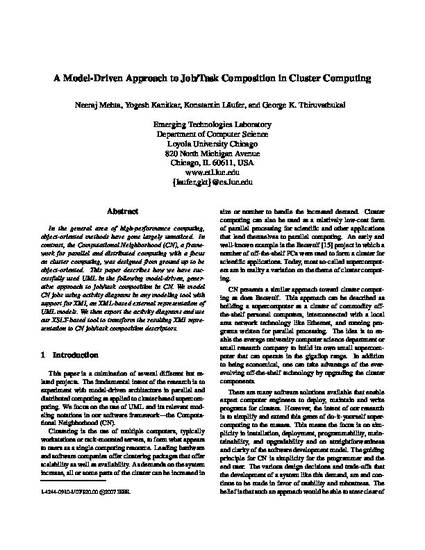
Article
A Model-Driven Approach to Job/Task Composition in Cluster Computing
IEEE International Parallel and Distributed Processing Symposium
Document Type
Conference Proceeding
Publication Date
1-1-2007
Pages
233
Publisher Name
IEEE Computer Society
Disciplines
Abstract
In the general area of high-performance computing, object-oriented methods have gone largely unnoticed. In contrast, the Computational Neighborhood (CN), a framework for parallel and distributed computing with a focus on cluster computing, was designed from ground up to be object-oriented. This paper describes how we have successfully used UML in the following model-driven, generative approach to job/task composition in CN. We model CN jobs using activity diagrams in any modeling tool with support for XMI, an XML-based external representation of UML models. We then export the activity diagrams and use our XSLT-based tool to transform the resulting XMI representation to CN job/task composition descriptors.
Comments
© 2007 IEEE. Personal use of this material is permitted. Permission from IEEE must be obtained for all other users, including reprinting/ republishing this material for advertising or promotional purposes, creating new collective works for resale or redistribution to servers or lists, or reuse of any copyrighted components of this work in other works.
Creative Commons License
Creative Commons Attribution-Noncommercial-No Derivative Works 3.0
Copyright Statement
Copyright © 2007 Neeraj Mehta, Yogesh Kanitkar, Konstantin Läufer, George K. Thiruvathukal
Citation Information
Neeraj Mehta, Yogesh Kanitkar, Konstantin Laufer, George K. Thiruvathukal, "A Model-Driven Approach to Job/Task Composition in Cluster Computing," ipdps, pp.233, 2007 IEEE International Parallel and Distributed Processing Symposium, 2007
